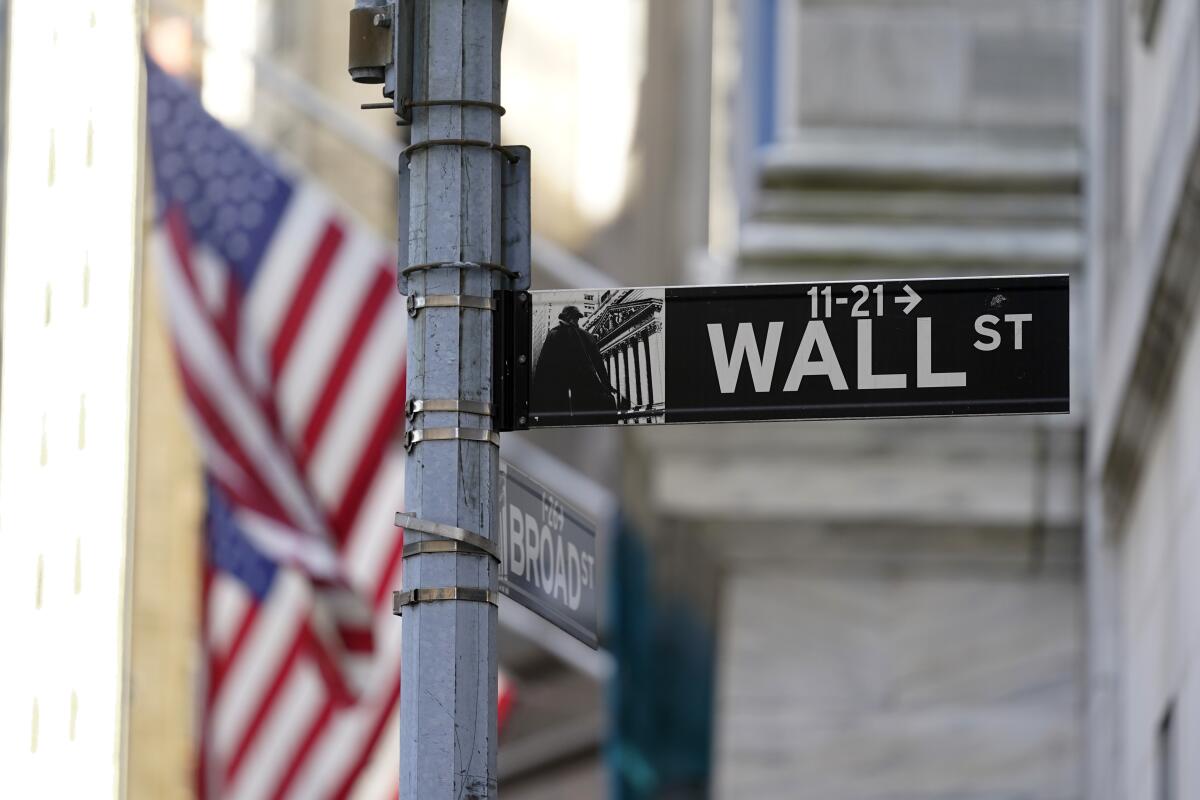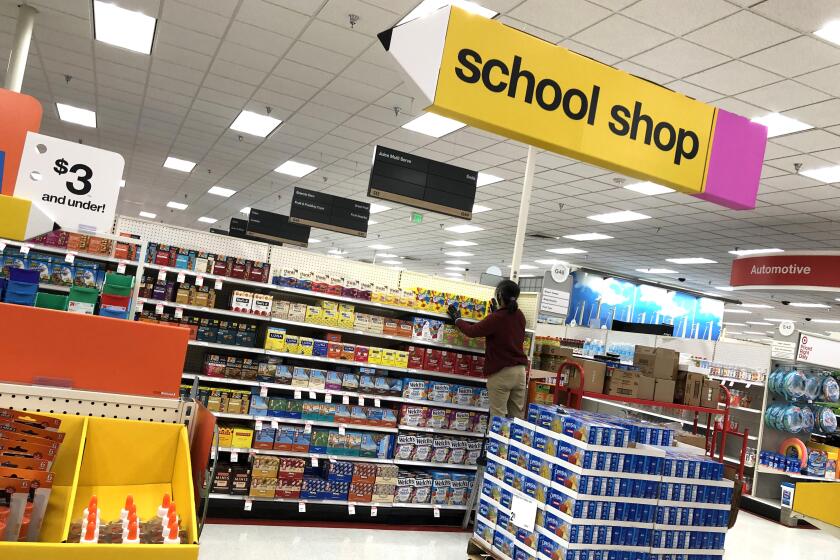Wall Street falls as the bond market cranks up the pressure

- Share via
Wall Street weakened Wednesday to worsen what’s already been a messy August.
The Standard & Poor’s 500 fell 33.53 points, or 0.8%, to 4,404.33, following up on its Tuesday tumble of 1.2%. The Dow Jones industrial average lost 180.65 points, or 0.5%, to close at 34,765.74, and the Nasdaq composite dropped 156.42 points, or 1.1%, to 13,474.63.
Increased pressure came from the bond market, where yields have recently neared their highest levels since the Great Recession sent interest rates collapsing. Yields climbed more after the afternoon release of the minutes from the Federal Reserve’s latest meeting.
The minutes suggested Fed officials are unsure about their next move after catapulting the main interest rate they control to its highest level in more than two decades. Hopes had been rising among investors that last month’s rate increase by the Fed would prove to be its last.
High rates work to grind down inflation by bluntly slowing the entire economy and hurting investment prices. The Fed’s minutes showed that officials still don’t think the job on inflation is done but that they also acknowledge the risk of going too far and torpedoing the economy. They said they’ll make upcoming decisions based on what data report about inflation and the economy tell them.
Some analysts took the minutes as a suggestion that another rate hike is possible, while others said it shows the Fed is probably done raising rates.
“Ultimately there were no major surprises in the minutes, as the Fed is expected to remain data dependent when determining the path of monetary policy through the end of the year,” said Sam Millette, fixed income strategist for Commonwealth Financial Network.
Big technology stocks and other investments seen as particularly vulnerable to higher rates were some of the day’s heaviest weights on indexes. Tesla fell 3.2%, Facebook’s parent, Meta Platforms, dropped 2.5%, and Amazon slid 1.9%.
Wall Street has generally been retrenching this month on several concerns, including worries that torrid gains made this year through July were overdone and that interest rates may stay high longer than expected.
Americans increased their purchases at retailers last month in a sign that solid consumer spending is still powering a resilient U.S. economy.
A surprisingly strong report on sales at U.S. retailers helped cause Tuesday’s slide in stocks, as it suggested upward pressure on inflation still exists. Although strong economic reports calm long-held worries about a possible recession, they could also end up keeping rates higher for longer than traders expect.
Data released Wednesday showed that U.S. industrial production improved by more than economists expected last month. Home builders also broke ground on more homes.
Treasury yields have been generally climbing as reports have painted a picture of a still-solid economy. That pressures stocks because when safe bonds are paying more in interest, investors feel less need to pay high prices for stocks and other risky investments.
Some teachers are turning to social media to afford supplies and help make their classrooms more equitable.
The yield on the 10-year Treasury rose to 4.26% from 4.22% late Tuesday. It’s once again close to where it was when the 2007-09 Great Recession sent interest rates crashing. It helps set rates for mortgages and other important loans.
The 10-year Treasury Inflation Protected Security, which takes inflation into account, is at its highest level since 2009, according to Tradeweb.
On Wall Street, Intel fell 3.6% after it and Tower Semiconductor agreed to call off Intel’s $5.4-billion buyout of the Israeli chipmaker. The deal faced resistance from Chinese regulators.
Agilent Technologies fell 3.4% despite reporting stronger profit for the latest quarter than analysts expected. Its forecasts for upcoming results, including revenue for the full year, fell short of expectations. It pointed to a challenging economy, particularly in China.
Coinbase Global swung after it said it plans to soon offer futures trading for cryptocurrencies to eligible U.S. customers after receiving federal regulatory approval. It rallied in the morning before finishing with a drop of 0.2%.
Target and TJX, the company behind T.J. Maxx and Marshalls, helped to limit the market’s losses. Target rose 3% and TJX climbed 4.1% after both reported stronger profit for the spring than analysts expected.
Progressive jumped 8.9% for the biggest gain in the S&P 500 after reporting its results for July, and other insurers also rallied to help lead the market.
In stock markets abroad, indexes were mixed across Europe. Stocks were down more sharply in Asia, where worries are high about a faltering economic recovery in China.
Stocks fell 1.4% in Hong Kong, 1.8% in Seoul, 1.5% in Tokyo and 0.8% in Shanghai.
Coming into this year, the expectation was that China’s economy would grow enough after the government removed anti-COVID-19 restrictions to prop up a global economy weakened by high inflation. But China’s recovery has faltered so much that it unexpectedly cut a key interest rate Tuesday and skipped a report on how many of its younger workers are unemployed.
AP writers Yuri Kageyama and Matt Ott contributed to this report.
More to Read
Inside the business of entertainment
The Wide Shot brings you news, analysis and insights on everything from streaming wars to production — and what it all means for the future.
You may occasionally receive promotional content from the Los Angeles Times.












